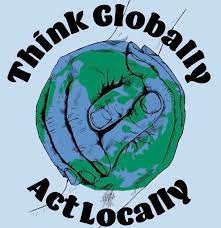By: Paul Bubbosh, CESP Faculty Associate
As a child of the 1970s, I recall seeing a bumper sticker that read “Think Globally, Act Locally.” This was the heyday of the environmental movement, and this slogan captured the sentiment at the time: local actions—your own behavior—mattered. I wondered if a Madison Avenue firm came up with that slogan, but as it turns out it is attributed to Patrick Geddes who coined the phrase in 1915. Geddes was a conservationist who took a minimalist approach to conservationist practices. He would survey a community and select a few things to change, like adding some green space as a park. His theory involved working incrementally on an issue, starting small, slowly growing. There is an intuitive quality to this approach, and when I consider the “think globally” part I viewed it as some amorphous, undefined movement. What I never grasped, until recently, is how the two connect; how they influence each other in a more direct way. Today’s great environmental challenges are still global in nature and acting locally still gets the job done at a community level—but I draw a direct line from that small community project, in Geddes’ mind, to solving national or global challenges. Let’s return to the heyday of the environmental movement.
About 50 years ago, a bipartisan consensus in Congress produced some of the most powerful laws ever created (not just environmentally powerful): National Environmental Policy Act, Clean Air Act, Clean Water Act, Endangered Species Act, hazardous waste laws, and toxic and pesticide laws. These laws changed our country, for the better. The change came about because the United States, in the 1970s, was ready to confront the environmental issues of the day. We were at a place, economically, that allowed citizens to turn their attention to the environmental harms around them. Everyday Americans were waking up, going to work, raising families, and seeing smog, breathing foul air, walking by polluted rivers, watching species disappear, fearing the hidden dangers of chemicals and pesticides, and watching the news about toxic waste rising in people’s basements. And then people said enough is enough, and legislators listened. That was then, but today things are different.
Since the 1970s, Congress has…well, cue the sound of crickets. Congress has been unable to muster the political means to address important environmental issues of the last few decades, and let’s just put it out right now–climate change. Some of us hear the arguments, read the science, listen to the news, watch the disasters unfold, and see the photos. Yet Congress has failed to promulgate meaningful legislation that puts us on course to de-carbonize and achieve a net zero carbon pathway. Why? And why is today different from the 1970s. Why are today’s legislators acting differently?
Today, we live in a hyper-partisan political dimension where the extremes, once shunted to the side, appear to have taken control of the middle, front-and-center. Legislators no longer “debate,” but rather posture at the extremes for the folks back home. The idea of “compromise” is now a dirty word akin to cowardice. But, historically, our political parties have always been at each other’s throats. This is not the first time we see political partisanship as dysfunctional. Something else is afoot here that explains the difference.
Back in the 1970s, the business community fought tooth-and-nail to stop environmental laws, and they lost. The lost by huge bi-partisan margins in Congress. They lost because they lacked the clout to take on not just the environmental advocates, but the regular folks in our communities. They re-grouped and decided to take a different approach by funding their own think tanks, and these organizations published their own reports rebutting the environmentalists. This provided the necessary political “cover” to vote against environmental and natural resource protections. In short order, a major political party, the GOP, created their own litmus test for party identification: you had to be anti-regulatory when it came to environmental laws, and environmental laws were equal to killing jobs. The political rift on environmental issues has grown ever since.
We have lost the Congress.
There’s no other definitive proof of this than the recent Supreme Court decision in West Virginia vs. EPA. In that case, our highest court inserted itself in a non-case, and said: if you want to do anything really big, like curtail greenhouse gas emissions from the energy sector, you need explicit direction from Congress to tell the EPA to do that really big thing. Otherwise, EPA, stop acting like you guys are experts and know how to solve our environmental problems. In short, the ball is in Congress’ court. I think you know where I am going with this.
Congress has no balls.
If you think about it, the strategies employed to combat progress on environmental protections , such as the ‘regulation equals job killer,’ are an exceptionally irresistible rationale for some politicians. Who’s to argue with job losses? Well, economists for one. The idea that environmental regulations reduce employment has been discredited repeatedly. But no one’s paying attention because the issue has been hijacked by misinformation and hyperbole. How do the common folk feel about more intense disasters and heatwaves, property swallowed up by the sea, etc? Well, no one really bothers to ask them anymore because it is assumed that their political affiliation dictates their views. Ah, there’s the nub.
If you vote a certain way, then you must think a certain way. The litmus test is alive and well. Well, maybe not.
I will posit here, for the sake of this argument, that there are two levers of political action. The first is grassroots—the traditional lever of the common folk who speak up and are heard because they’re the “little guy.” This was the 1970s. Everyone likes helping the little guy.
The second lever, and the more pernicious one that dominates today, is the special interest group that ostensibly speaks for the little guy and tells our elected representatives how to think about an issue. Let’s be fair and admit this happens on both sides of the political aisle. Special interest groups hold all the power. They are well funded and make or break a legislator’s political career. As long as special interests control the dialogue, nothing will change in Congress. The question comes down to how you break that special interest logjam and get back to what the commonfolk really care about. This is especially difficult in times of dysfunction, divisiveness, and misinformation.
The path forward is the Geddes model with a twist. Instead of “Think Globally, Act Locally,” I will add this nuance: Act Locally, Solve It Globally.
We must begin at the community level. We must engage red, rural America on the benefits of energy efficiency, renewable energy, property protection from natural disasters (resiliency), independence from the grid, saving God’s green earth for future generations. Red, rural America is where it all begins. Our conversation is about saving money, protecting property and investments, self-sufficiency and not relying on foreign oil, honoring God and country, preserving our environment for future generations. This is not about climate change. This is about putting food on the table, heck, having a table to begin with, and enjoying the quality of living.
This is not easy. This is the high hanging fruit. We tend to think of this approach as too time consuming and labor intensive. Guess what? You’re right, it is time consuming and labor intensive. But it also works to do the one thing that no one has been able to accomplish—it splits the special interest/legislative vortex by introducing real American voices into the dynamic. It changes the political conversation in a fundamental way and begins to split dissolve that litmus test about environmental protections as a the “other side.”
We need to go into communities and work on their goals. Their goals must align with our goals for a cleaner, safer, and more economically efficient country. We need to change the conversation in a dramatic and lasting way. For the time being, we need to shift our resources away from the special interest/legislative vortex (federal efforts) and start looking afresh at red, rural counties and cities throughout America. The argument for cleaner and more efficient energy sells itself easily. Would you like to save some money on your utility bills? Would you like to live independent of the grid—no longer reliant on the big, bad utility company? Would you like to stick it to Big Oil and foreigners who sell us their oil and keep the profits in the USA? The answers to these questions by most Americans are a resounding yes.
Let’s bring it home. George Mason University launched the Local Climate Action Plan Initiative in 2021 to demonstrate how we can turn red, rural Virginians into advocates for a cleaner and more efficient energy system. We accomplish this by working closely with local government and community leaders in three areas. First, we work together to better understand the community’s baseline energy consumption (read emissions) and its vulnerabilities (read climate impacts). This requires modeling energy consumption in buildings, transportation, and other areas. This gives us a roadmap to make improvements. Second, we bring the community together over the course of several months (slow and steady) to draft a plan to save energy and safeguard their property. Third, we embed Mason students in key local government and non-governmental organizations to assist implementing the plan. And we do all this at minimal or no cost to the community.
At the end of the day, we get a community that gets it. They see the value in saving energy, switching to renewables and energy efficient technologies, and making lifestyle changes. It is no longer about talking heads on tv shows. It becomes real in terms of dollars saved, lives improved, property protected.
Our hypothesis is that this approach begins to change the way Americans view environmental protections. This approach has the greatest likelihood of disarming the special interest group stranglehold on our elected leaders because it drives a wedge between reality and hyperbole. By working with local communities, especially in red, rural America, we return to a place where grassroots beliefs drive political thinking and action, and hopefully, leads to bi-partisan consensus on environmental protections. Acting locally is no longer just about what happens in our backyards. It is a direct line to changing our country.

